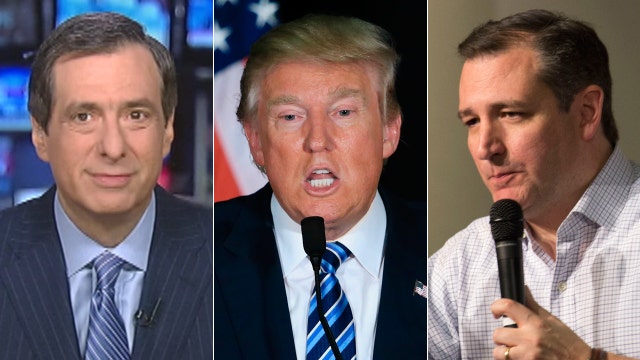Kurtz: The Donald and Ted's delicate dance
'Media Buzz' host reacts to ongoing feud between GOP rivals Ted Cruz and Donald Trump
Early last summer, Ted Cruz had his campaign conduct a private poll of who Donald Trump’s supporters would back if he faltered in the race.
Only 4 percent picked Cruz, according to an adviser familiar with the survey. Despite the media narrative that Cruz would be the natural alternative for Trump fans, the rest were scattered among other Republican contenders.
But now that the Texas senator is much better known, in part through the televised debates, public polls show him inheriting about 55 percent of Trump backers, and more than 60 percent in New Hampshire.
That goes a long way toward explaining why Cruz doggedly deflects criticism from the GOP front-runner without hitting back.
What’s more, Cruz’s inner circle views Trump as a celebrity who doesn’t occupy the usual political space in a presidential campaign. They have therefore concluded that any attacks on Trump wouldn’t benefit them and play as more of a curiosity, like Adele slamming Taylor Swift.
Trump, while saying he is just responding to questions, has repeatedly raised the issue of Cruz having been born in Canada and asked whether this could expose him to a lawsuit over his qualification for the presidency. (Cruz’s mother is an American citizen and the widespread assumption has been that makes him a natural-born citizen, as John McCain was despite being born in the Panama Canal Zone.)
Cruz responded with humor, posting a video of the Fonz in an episode where he jumped the shark. When pressed by reporters, he said news outlets were following a Democratic playbook. “One of the things that the media loves to do is gaze at their navels for hours on end by a tweet from Donald Trump or from me or from anybody else. Who cares?”
He also declined to respond with criticism when Trump said that Cruz had once supported “amnesty,” a reference to his 2013 amendment to a Rubio-backed bill that would have provided illegal immigrants with a path to legalization under certain conditions. Cruz has said he regarded this as a poison pill to kill the bill. (He did tell CNN this week that he reversed his position on expending the H1B program of legal visas for foreign workers.)
What’s striking, in reviewing the Cruz coverage, is how little we know about the background of the man who is now in a position to win the Iowa caucuses.
Politico has a good piece on Cruz’s five years as Texas solicitor general, during which he argued eight cases before the Supreme Court: “He used the role in a new and far more ideological way than his predecessors, taking a relatively low-profile job that had traditionally been used mostly to defend the state government and turning it into a stage for pushing national conservative causes.”
Cruz took on the Texas establishment in 2012, knocking off the party favorite for the Senate nomination, Lt. Gov. David Dewhurst, with backing from the Tea Party. That come-from-behind victory, in which Cruz started with little money and prevailed in a runoff, in many ways created the template for his Washington career.
Cruz has famously clashed with his fellow lawmakers, sometimes bringing the institution to a halt.
National Review Editor Rich Lowry takes note of this:
“Certainly, Cruz is not ascending on the basis of warm feelings from his colleagues. Cruz portrays his unpopularity within the Senate as establishment distaste for him as a lonely man of principle. But it is a genuine personal dislike. Not that Cruz cares.”
Lowry compares Cruz to Richard Nixon, putting aside Watergate, as a not particularly charming pol who nonetheless managed to win:
“Nixon went to tiny Whittier College and resented the Northeastern elite; Cruz went to Princeton and Harvard and could be a member of the Northeastern elite in good standing if he wanted to be.
“But Cruz is cut from roughly similar cloth. He wears his ambition on his sleeve and is not highly charismatic or relatable. In high school, he could have been voted most likely to be seen walking on the beach in his dress shoes. If Cruz wins the nomination, it will be on the strength of intelligence and willpower. He will have outworked, outsmarted and outmaneuvered everyone else.”
Even the New Republic gives Ted his due:
“Cruz would be the most unapologetically right-wing major-party nominee since Barry Goldwater, and would thus have an extremely difficult time appealing to the shrinking yet still-meaningful, pool of voters who are undecided between Democrats and Republicans. But he would also give the GOP something it desperately needs: an opportunity to purge its ranks of scores and scores of self-interested operatives and advisers who treat campaigns as opportunities to soak candidates and build networks of future clients. It would also provide a clarifying moment for the conservative movement and the rest of the country. For conservatives, it would be the first time since Ronald Reagan (or arguably Goldwater) that they’d see the Republican Party run a candidate who is a leader of the movement itself.”
The challenge for Cruz now is to fill in the blanks in his record and life story before the media define him in ways he may not want.
And then there are those Donald voters. The Cruz team believes that if Trump’s fans, many of them turned off to politics, turn out in large numbers, he wins. If not, Cruz wants to emerge as their second favorite guy.

























